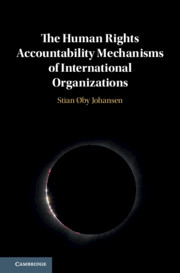
- Cited by 4
-
Cited byCrossref Citations
This Book has been cited by the following publications. This list is generated based on data provided by Crossref.
Santi, Silvana 2022. La externalización de la “matriz de gestión migratoria” de la UE hacia América Latina y el Caribe. Estudios Fronterizos, Vol. 23, Issue. ,
de Waele, Henri 2023. Legal Dynamics of EU External Relations. p. 61.
Steinert, Christoph Valentin 2024. Elitist Remedies? Complaint Resources and Representation in International Human Rights Bodies. International Studies Quarterly, Vol. 68, Issue. 2,
Heaphy, Janina 2024. When identity meets strategy: The development of British and German anti-torture policies since 9/11. Cooperation and Conflict, Vol. 59, Issue. 1, p. 66.
- Publisher:
- Cambridge University Press
- Online publication date:
- August 2020
- Print publication year:
- 2020
- Online ISBN:
- 9781108862608




